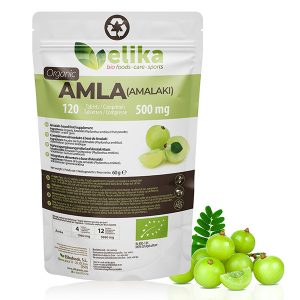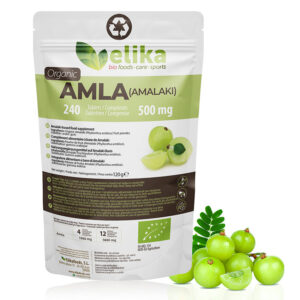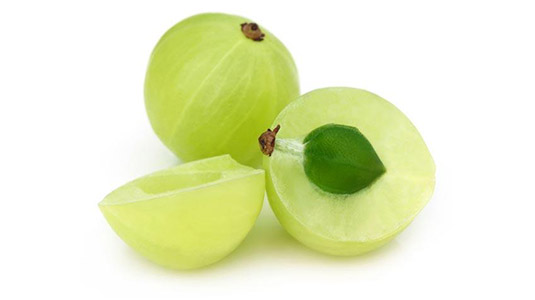-
 AMLA Tablets (120)14,65 €
AMLA Tablets (120)14,65 €
-
 AMLA Tablets (240)19,99 €
AMLA Tablets (240)19,99 €
What is Amla?
Amla (Emblica officinalis or Phyllanthus emblica) is commonly called Indian gooseberry and Amalaki. It is perhaps the most important plant in Ayurvedic medicine, used for thousands of years. Human clinical trials report dramatic health benefits.
Clinical trials
Human clinical trials report that Amla is slimming, controls hyperglycaemia, has heart-healthy properties, reduces hypertension, reduces rhinitis, improves the skin, is anti-inflammatory, improves the immune system, is antineoplastic and protects the hepatopancreas from the harmful effects of alcohol.
What does it contain?
One of the most surprising health properties is its ability to lower total lipids, cholesterol, triglycerides, LDL cholesterol and VLDL cholesterol from 34 to 82% and to increase HDL cholesterol (good cholesterol), all in perfect balance.
Ayurvedic medicine
Diarrhoea, jaundice, inflammation, antidiabetic, antibacterial, antioxidant, antiulcerogenic, hepatoprotective, gastroprotective, analgesic, antitussive, antiatherogenic, adaptogenic, cardioprotective, gastroprotective, antianemic, antihypercholesterolemic, wound healing, antidiarrhoeal, antiatherosclerotic, hepatoprotective, nephroprotective and neuroprotective.

Pathologies, treatments and benefits
Diabetes
Hyperglycaemia (high blood glucose) is a disease state associated with pre-diabetes and diabetes. Both are increasing worldwide and are responsible for the risk of cardiovascular, arthritic and neurodegenerative diseases.
Physical exercise, diet and food supplements are the healthiest alternatives to prevent or treat hyperglycaemia. One of the most common microvascular complications affecting more than 50% of diabetic patients is diabetic neuropathy. It causes diabetic neuropathic pain, a type of pain that is difficult to treat due to the lack of understanding of its aetiology. Treatment with the aqueous extract of Amla (250, 500 and 1000 mg/kg/day) attenuates behavioural, biochemical and molecular alterations in a dose-dependent manner.
Amla not only attenuates the diabetic condition, but also reverses neuropathic pain through modulation of oxidative-nitrosative stress.
In a clinical trial, both normal and diabetic volunteers who received 1, 2 or 3 grams of Amla daily had decreased postprandial glucose at 21 days. In addition, those receiving the 2- and 3-gram doses lowered LDL (bad cholesterol) and triglycerides and increased HDL (good cholesterol).
Cholesterol
Elevated levels of total plasma cholesterol and triglycerides are causal factors in the development of atherosclerosis and coronary heart disease.
The intake of Amla reduces serum total lipids, total cholesterol, triglycerides, LDL-cholesterol and VLDL-cholesterol by 34 to 82%, while increasing HDL-cholesterol (good cholesterol). These results can be described as spectacular as it produces a balanced and complete benefit in all the components related to cholesterol metabolism and, in addition, with hypoglycaemic capacity. This first trial was carried out on 24 birds. They ingested 2% Amla in the feed. Subsequently, this research was extended to a human clinical trial. The results indicated that Amla not only reduced total cholesterol, triglycerides, LDL and VLDL and increased HDL, but also reduced hypertension. Comparatively, Amla produced a more beneficial health effect than simvastatin (20 mg/day). Amla may offer significant protection against atherosclerosis and coronary artery disease. Trial in 60 male and female patients with type II hyperlipidaemia, with total cholesterol and low-density lipoprotein level of more than 240 mg and 130 mg respectively. One group was given a 500 mg/day capsule of Amla and the other group 20 mg/day of Simvastatin for 42 days.
Cardioprotector
Amla fruit has cardiotonic activity and its possible mechanism of action is via calcium channels.
Amlamax, a purified extract of Amla containing approximately 35% galoellagitannins along with other hydrolysable tannins, in addition to reducing total cholesterol and increasing HDL cholesterol, also reduces inflammation. Amlamax should be considered for the management of heart disease. Trial in volunteers given 500 mg and 1000 mg per day of Amlamax for 6 months.
Alcohol
Long-term alcohol consumption is one of the causes of liver failure and death. To compound the problem, there are no safe hepatoprotective drugs.
Amla has beneficial effects on ethanol-induced hepatotoxicity through its antioxidant, anti-inflammatory and antifibrinolytic capacity.
Cystic fibrosis
Pyrogallol, a compound in Amla, has anti-inflammatory properties and could be useful in the treatment of cystic fibrosis.
Rhinitis
Allergic rhinitis is an increasingly common immunological disorder.
Amla mixed with medicinal plants (Chebula, Terminalia Bellerica, Albizia lebbeck, Piper nigrum, Zingiber officinale and Piper longum) has anti-inflammatory, antispasmodic, antioxidant and antihistamine properties. This test was carried out on Wistar rats for 28 days with no adverse effects.
Osteoartritis
The mixture of Amla with ginger (Zingiber officinale) and (Tinopsora cordifolia), has beneficial effects on osteoarthritis of the knee. Trial in 92 patients with osteoarthritis of the knee for 6 weeks. No adverse effects were detected.
Amla inhibits hyaluronidase and collagenase enzymes that are responsible for skin wrinkling and has chondrioprotective activity that could be used for osteoarthritis therapy.
Skin
Amla is also used as a skin cosmetic and has anti-ageing activity.
Gastroprotector
It has gastroprotective properties in gastric ulcers.
